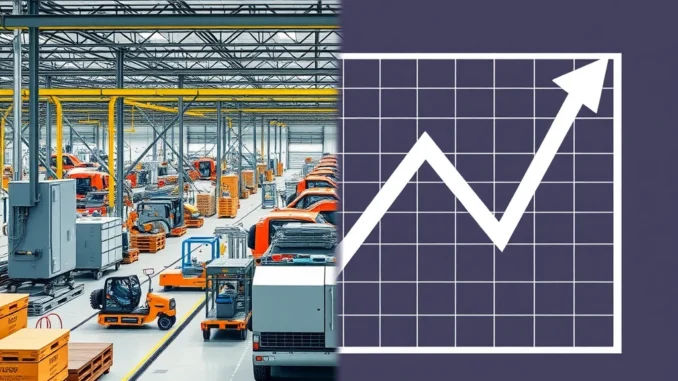
The debate around the U.S. economy is heating up, and Commerce Secretary Howard Lutnick is firmly planted in the corner of former President Trump. In a recent interview that’s sending ripples through financial circles, Lutnick doubled down on Trump’s economic policy, even in the face of potential recession. But is this unwavering support justified, and what does it mean for the average American and the volatile cryptocurrency market?
Decoding Trump Economics: ‘Worth the Risk’ Approach
Lutnick’s interview with CBS News was nothing short of a strong endorsement. He declared Trump’s economic policy approach “worth it,” brushing aside concerns about a possible recession. This isn’t just a casual statement; it’s a clear signal from a high-ranking official that the administration is prepared to play hardball with the economy to achieve its goals.
Here’s a breakdown of Lutnick’s key points:
- Unwavering Support: Lutnick explicitly supports Trump’s economic strategies, positioning them as necessary for long-term American prosperity.
- Blame Game: He attributes current economic challenges to the previous Biden administration’s policies, labeling them as “nonsense” and suggesting Americans have already suffered under them.
- Growth Vision: Lutnick paints a picture of Trump’s policies leading to tangible benefits – increased “revenues,” significant “growth,” and a resurgence of American manufacturing with new factories being built on U.S. soil.
- Recession Denial (Previously): Interestingly, Lutnick had previously stated to CNBC that he saw “no recession in America” on the horizon. This recent interview, while acknowledging recession risks, still maintains a positive outlook on Trump’s approach.
But what exactly are these “worth it” policies, and why are they stirring such strong reactions?
Understanding the Core of Trump’s Economic Policy
To understand Lutnick’s staunch defense, we need to delve into the key tenets of Trump economics. While specific details can be complex and ever-evolving, the core principles often revolve around:
- Tax Cuts and Deregulation: A cornerstone of Trump’s approach is reducing taxes for corporations and individuals, coupled with loosening regulations across various sectors. The aim is to stimulate business investment and economic activity.
- Trade Protectionism: “America First” trade policies, including tariffs and trade barriers, are central. The goal is to protect domestic industries, bring manufacturing back to the U.S., and reduce trade deficits.
- Energy Independence: Promoting domestic energy production, including fossil fuels, is another key element, aiming for energy independence and job creation in the energy sector.
- Focus on GDP Growth: A strong emphasis is placed on achieving high GDP growth rates as a primary measure of economic success.
These policies are designed to be aggressive and are often presented as a direct contrast to more traditional economic approaches. They are intended to shake up the status quo and deliver rapid, visible economic improvements – even if they come with potential risks.
Recession Risk: The Elephant in the Room
The crucial question hanging over this entire discussion is: what about the recession risk? Economists and analysts are increasingly debating the likelihood of an economic downturn. Factors like inflation, rising interest rates, and global economic uncertainties are all contributing to these concerns.
Lutnick’s acknowledgment of recession risks, even while defending Trump’s policies, is significant. It suggests a calculated gamble – the administration believes the potential long-term benefits of their policies outweigh the short-term pain of a possible recession. This is a high-stakes game, and the consequences could be far-reaching.
Is a Recession Inevitable? Factors to Consider:
| Factor | Potential Impact on Recession Risk |
|---|---|
| Inflation | High inflation erodes purchasing power and can lead to decreased consumer spending, a major driver of economic growth. |
| Interest Rate Hikes | To combat inflation, central banks often raise interest rates. This can cool down the economy, but also increase borrowing costs for businesses and consumers, potentially slowing economic activity. |
| Global Economic Slowdown | If major global economies slow down, it can impact U.S. exports and overall economic growth. |
| Geopolitical Instability | Events like wars or major political disruptions can create economic uncertainty and negatively impact markets. |
| Consumer and Business Confidence | If consumers and businesses become pessimistic about the future, they may reduce spending and investment, contributing to an economic downturn. |
Impact on the US Economy and Beyond
The stakes are incredibly high. If Trump’s economic policy succeeds as envisioned by Lutnick, the U.S. could see a period of robust growth, increased manufacturing, and potentially higher employment. However, if the recession risks materialize, the consequences could be severe – job losses, market instability, and economic hardship for many Americans.
For the cryptocurrency market, which often reacts to broader economic trends and investor sentiment, the implications are also significant. Economic uncertainty can drive investors towards assets perceived as safe havens, but it can also increase risk aversion, impacting volatile assets like cryptocurrencies in unpredictable ways.
Potential Scenarios and Crypto Market Impact:
- Scenario 1: Economic Boom under Trump Policies
- Possible Crypto Market Reaction: Increased risk appetite, potential for growth in crypto markets as part of a broader economic expansion.
- Scenario 2: Recession Triggered by Trump Policies
- Possible Crypto Market Reaction: Mixed reactions. Initially, potential sell-offs in risky assets like crypto. Later, possible safe-haven flows into Bitcoin or other established cryptocurrencies if economic turmoil intensifies.
- Scenario 3: Stagnant Economy with Persistent Inflation
- Possible Crypto Market Reaction: Increased interest in inflation-hedge assets like Bitcoin. Potential for stablecoins and DeFi to offer alternatives to traditional financial systems struggling with inflation.
Howard Lutnick: A Believer in the Trump Vision
Howard Lutnick‘s unwavering support is noteworthy. As a prominent business leader and Commerce Secretary, his voice carries weight. His confidence in Trump’s strategy, even amidst recession concerns, suggests a deep-seated belief in the potential of these policies to deliver long-term economic benefits.
However, it’s crucial to remember that economic forecasts are not guarantees. The future trajectory of the US economy will depend on a complex interplay of factors, both domestic and global. The debate surrounding Trump’s economic policies and their potential impact is far from over, and the coming months will be critical in determining whether Lutnick’s optimism is justified or if the recession risks will indeed materialize.
Final Thoughts: A High-Stakes Economic Bet
The U.S. economy stands at a critical juncture. Commerce Secretary Lutnick’s defense of Trump’s economic strategy highlights the administration’s conviction in their approach. Whether this strategy will lead to the promised “revenues” and “growth,” or whether it will inadvertently trigger a recession, remains to be seen. For investors, businesses, and everyday Americans, understanding the nuances of this economic gamble is more important than ever. Keep a close watch on economic indicators, market reactions, and policy developments as this story unfolds – the future of the U.S. economy, and potentially the cryptocurrency market alongside it, hangs in the balance.



